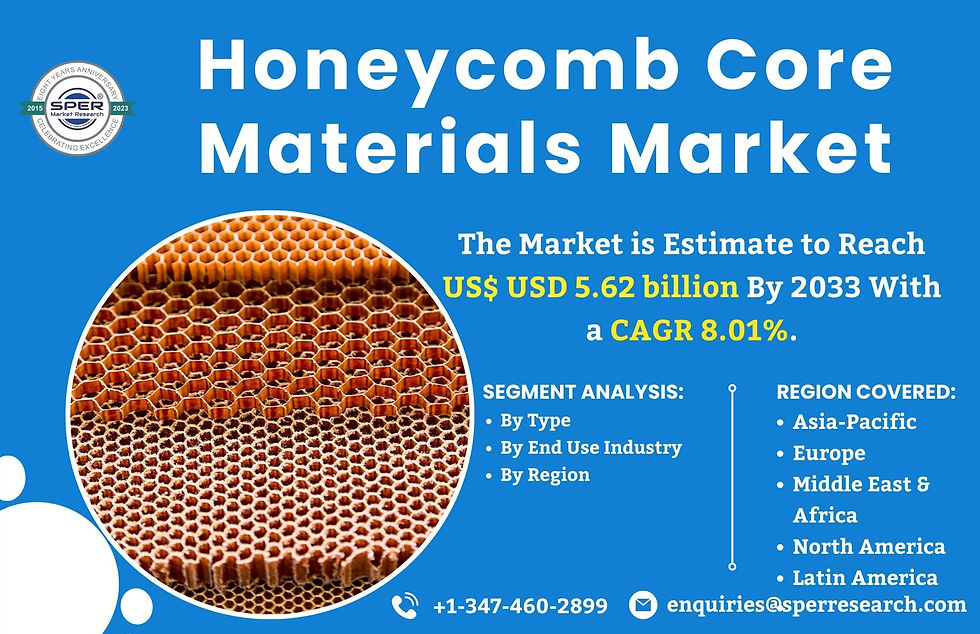Honeycomb Core Materials Market Size and Share, Growth & Analysis, Revenue, CAGR Status, Challenges, Future Opportunities and Forecast Analysis 2033
- James Wilson

- Jul 26, 2024
- 3 min read
Lightweight materials composed of manufactured or natural honeycomb structures are known as honeycomb core materials. It makes it possible to minimize the amount of material utilized and make the building lighter. It is economical as well. The construction has exceptional strength and rigidity because to the honeycomb core material. A variety of end-use industries are seeing an increase in demand for honeycomb core materials due to its stiffness, lightweight nature, and high strength. This is anticipated to stimulate the demand for honeycomb core materials structures. The packaging business uses a lot of paper honeycombs in pallets and boxes to preserve equipment, appliances, and other items, both domestically and commercially.
According to SPER market research, ‘Global Honeycomb Core Materials Market Size- By Type, By End Use Industry -Regional Outlook, Competitive Strategies and Segment Forecast to 2033 state that the global Honeycomb core materials Market is predicted to reach USD 5.62 billion by 2033 with a CAGR of 8.01%.

The need for honeycomb core materials has increased recently because to the growing interest in lightweight materials among a variety of end-user industries, including aviation, barrier, and marine sectors. When designing and producing machinery, including automobile, marine, and aircraft models, the most crucial factor to take into account is weight. Honeycomb core materials had a significant role in reducing weight in flying machine segments as well as auxiliary applications. As a result, demand for it is rising across a range of end industries.
Download our free sample report today and see the detailed insights we offer – https://www.sperresearch.com/report-store/honeycomb-core-materials-market.aspx?sample=1
These materials' limited flexibility and design may cause them to be less widely adopted for usage in a variety of applications in some sectors. Regular sizes and configurations are frequently used in the manufacturing of honeycomb structures. Although they can be cut or molded to some extent, they are not suitable for complex or custom patterns. Their restricted design flexibility may make them unsuitable for use in certain product manufacturing processes. For example, if a product is too expensive, it may not be widely accepted in all end-use industries. Likewise, aluminum honeycomb cores can only be utilized in extremely corrosive environments due to their susceptibility to stress corrosion. This restricts the product's application in the marine sector.
The market for honeycomb core materials was adversely affected by the COVID-19 epidemic. In addition, the COVID-19 outbreak, lockdowns, and supply chain disruptions all had a negative effect on the building and construction sector, which hurt the market for honeycomb core materials. Additionally, the demand for honeycomb core materials in the automotive, aerospace, commercial, and industrial sectors declined as a result of declining customer revenue and limits on overseas travel.
Because of its better and effective results North America, accounted for the biggest revenue share geographically. The expansion is also being aided by the proliferation of Honeycomb core materials market and the rise in major players in the Asia-Pacific, Latin America, market. Additionally, it is anticipated that the growing adoption of honeycomb core materials assisted operations with least challenging processes and increases power of the market. Additionally, Fabrinox, Argosy International, Schtz GmbH & Co. KGaA, TCCORE APPLIED HONEYCOMB TECHNOLOGY CO., others.
Honeycomb Core Materials Market Segments:
By Type:
Aluminium Core
Aramid Core
Paper
Thermoplastic
Others
By End Use Industry:
Packaging
Aerospace and Defense.
Construction and Infrastructure
Automotives
By Region:
Asia-Pacific
Europe
Middle East & Africa
North America
Latin America
For More Information, refer to below link –
Related Report –
Follow Us –
Contact Us:
Sara Lopes, Business Consultant – U.S.A.
SPER Market Research
+1-347-460-2899











Comments